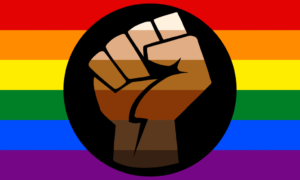
Growing up as a Black and openly gay woman almost always feels like I have three strikes against me. Racism, homophobia, and sexism all play a part in the harsh reality of society and the scared thoughts I have had about being open with my sexuality. As society becomes more understanding, unapologetic and accepting because of the younger generations, we can only hope that young, Black LGBTQ+ individuals receive more support during these trying times.
After the May 27 spectacle involving Tony McDade, a 38-year-old transgender Black male shot and killed by the Tallahassee Police Department, protests emerged as the LGBTQ+ community and allies became outraged that another transgender individual lost their life. As my heart sank to my stomach after reading stories on McDade’s last moments, I can only think of how violence plagues the LGBTQ+ community and its effect on the mental health of young people.
According to npr.org, LGBTQ+ youth living in fear due to unsupportive households during quarantine is not only problematic but triggering psychological harm. While being terrified of rejection or retaliation from their own families, our youth now continue to be even more terrified of being open about their sexuality outside of their homes.
National Public Radio quotes psychologist Megan Mooney, saying that “we are most concerned about is seeing increases in anxiety and depression including suicidality,” because of discouraging and discriminatory environments in lockdown.
The 2019 Black and African American LGBTQ Youth Report by the University of Connecticut and the Human Rights Campaign (HRC) reported that being Black, LGBTQ+ and young can increase the risk of experiencing discrimination.
Sixty-three percent of Black transgender and gender-expansive youth avoid using the school bathroom, and 82% of LGBTQ+ youth have been verbally abused because of their identity. Eighty percent of those surveyed typically feel “depressed, down, worried, nervous or panicked.” This list of negative statistics around discrimination faced by our Black youth because of their sexual orientation continues to be lengthy and unsettling.
“While there is immense power in being both a person of color and LGBTQ, holding multiple marginalized identities can magnify discrimination,” stated the HRC report. “This reality can have a devastating impact on Black and African American LGBTQ youth’s mental health and overall well-being.”
The Trevor Project is the “leading national organization providing crisis intervention and suicide prevention services to lesbian, gay, bisexual, transgender, queer and questioning (LGBTQ) young people under 25” and it has done extensive research on the mental health of Black LGBTQ+ youth.
Thetrevorproject.org identified eight common emotions and feelings that young LGBTQ+ individuals may be facing since the beginning of this pandemic. The recent events further supporting the Black Lives Matter movement’s justifiable demands for change opened a lot of eyes to the systematic racism and homophobia that have been running rampant through this country.
From grieving the senseless deaths of Black people, especially those who identified themselves as LGBTQ+, to the feeling of disconnect from white allies, our youth are feeling even more hopeless, helpless, enraged, fearful and numb to our current realities sparking their trauma. As they are dealing with identifying their sexual orientation, pronouns and gender, Chief Clinical Operations Officer of the Trevor Project, Tia Dole, emphasizes how normal these feelings are and how we as a community can help lighten the load of the world from our youth.
Checking on Black LGBTQ+ youth, educating ourselves and providing other help options or services are on the list of support options provided by Dole, which is only the start of making a different in the mental health and lives of our youth.
According to marieclaire.com, there are over a dozen Black-led services and groups for the LGBTQ+ community that need our support to fulfill the need for more safe spaces and acceptance for everyone.
Organizations like the LGBTQ+ Freedom Fund, the Transgender District, the Anti-Violence Project and so many more are working to end violence, mass incarceration and discrimination against this community. Becoming an ally, educating ourselves, and assisting these organizations with their initiatives can help create a better future for our LGBTQ+ youth who continue to feel unsupported, unwanted or uncomfortable to be themselves in all spaces.